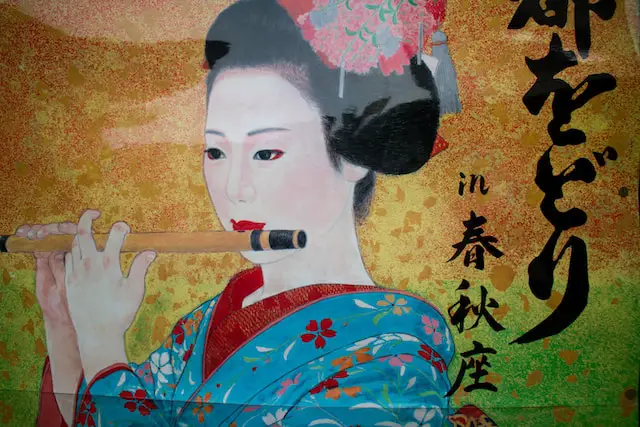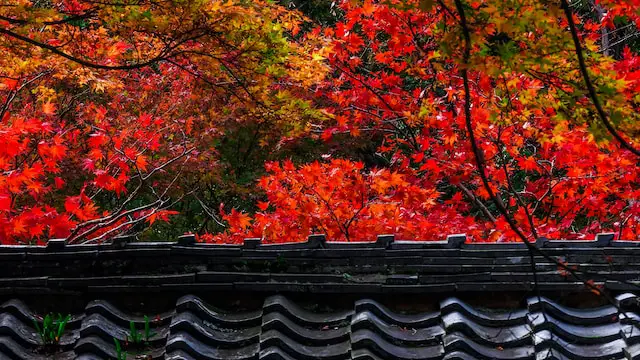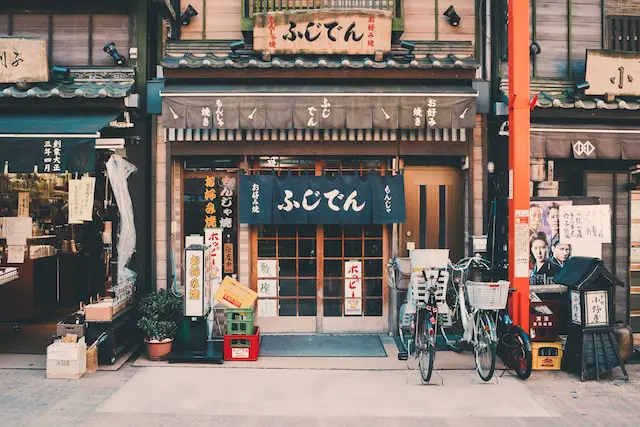Whether in the rustling leaves of a bamboo forest or the serene stillness of a stone garden, the ethos of Zen philosophy is unmistakably imbued in Japanese Culture. Defined by its desire to cultivate inner richness and enlightenment through contemplation and intuition, Zen influences are unmistakingly profound in the country’s traditional customs, daily routines, and gift for creating beautiful and simple aesthetics.
One of the most captivating legacies of Zen’s permeation can be observed in the arts. Spanning across diverse mediums like painting, calligraphy, ceramics, architecture, and garden design, this religious philosophy has fostered an array of artistic expressions deeply intertwined with Japanese cultural identity. Accordingly, let’s delve into the unique world of Zen and its longstanding influence on the arts in Japan, which continues to resonate today.
Understanding Zen Art
The intricate relationship between Zen and Art in Japan is a fascinating journey to learn about. With Zen Buddhism, art goes beyond merely being a form of aesthetic expression. Instead, it becomes a pathway to spiritual awakening. Captivating examples of such connections are often found in Japanese Zen art, which manifests the teachings of Zen philosophy.
Zen philosophy emphasizes simplicity, naturalness and austerity, common principles also observed in Zen art. Every brushstroke in a Zen ink painting or every rock arrangement in a Zen garden, expresses profound concepts such as emptiness, impermanence, and enlightenment. Zen art is not solely about capturing the physical world but rather presents the mind’s abstract observations and interpretations.
A deeper understanding of Zen art offers a rich appreciation of the mind and world of Zen monks who were often responsible for creating these artworks. Famed Zen arts like ink painting, calligraphy, poetry, and garden design, guide the mind towards the Zen state of mindfulness, and promote quiet introspection.
It encourages observers to disregard the literal and explore the reactions prompted by the art, thereby gaining a glimpse of Satori, or enlightenment. The essence of Zen art is to provide a tangible conduit to facilitating this profound interaction and understanding.
To truly appreciate the complexity and depth of Japanese Zen art, one must delve into its spiritual underpinnings and the philosophy it originates from. Visiting Japanese art museums and temples where Zen art is embodied will undoubtedly immerse you in the world of Zen, transcending visual delight to an epiphany of mind and spirit.
Ryoan-ji Temple – The Zen of Rock Gardens
true to its roots in Zen culture, Japanese culture reverberates with the simple yet profound principle – less is more. This ethos brightly sparkles in the heart of Kyoto, at the serene corridors of the Ryoan-ji Temple.
Distinctly transcending an aura of tranquillity, Ryoan-ji is arguably the most famous rock garden globally, enveloping its spectators in an inexplicable Zen calm. Designed in the tradition of Karesansui, the garden embodies the Zen spirit through its intriguing arrangement of 15 rocks amidst white gravel.
Arguably, the Ryoan-ji Temple presents a meditative puzzle where the garden’s viewing angle subtly obscures one rock from sight, making it impossible to behold all 15 rocks simultaneously. This enigmatic feature reflects a central tenet of Zen philosophy – embracing the incomplete and impermanent nature of existence.
The mystical experience, surrounded by earthen walls and a waterfront backdrop, accentuates the bustling flora and fauna – a wholesome palette of Japan’s distinct four seasons. This enduring rhythm of nature imparts a timeless charm to Ryoan-ji’s rock garden, making it not just a worthy visit, but a soulful journey into the heart of Japan’s Zen culture.
Unravel an emblem of Zen’s alluring simplicity at the heart of Kyoto’s majestic heritage – at Ryoan-ji temple, where each stone whispers tales of stillness, illuminating the path to inner peace.
Museum of Traditional Japanese Art Crafts – Embracing Zen in Crafts
Japan is known for marrying tradition and modernity, a concept perfectly encapsulated within the Museum of Traditional Japanese Art Crafts. While numerous cultural elements of Japan draw your attention, there’s a certain allure that remains rooted in the Zen-infused tradition of Japanese craft.
Located in central Tokyo, the museum houses an array of exquisite craftworks, from ceramics to textiles, lacquerware to metalwork. Key to the beauty and profundity of these crafts is the influence of Zen in Crafts. The craftsmen, often guided by the Zen philosophy, emphasize mindfulness, simplicity, and the raw nature of materials in their craftworks, deriving a minimalist aesthetic closely associated with Zen.
These works of art are not merely beautiful; they serve as mirrors to the inner world of the craftsperson and often aim to provide a Zen-like experience to the viewer. The imperfections, the wabi-sabi, is intentional, reflecting the beauty that can be found in the incomplete and impermanent, another Zen concept.
Viewing these traditional crafts is almost akin to walking down a tranquil Zen garden path. Each piece whispers a story of a calm and focused mind, speaks of intricate skills perfected over time, and offers insight into Japan’s cultural heritage routed through the trail of Zen philosophy. Delving into this experience can transport one to a realm of profound peace and introspection.
The Museum of Traditional Japanese Art Crafts serves as a striking testament to how deeply Zen philosophy is woven into the fabric of Japan’s artistic tradition. Whether you’re a fan of Japanese craftworks, or someone simply seeking an enriching cultural experience in Tokyo, a visit to this museum should be high on your list.
Nezu Museum – Blending Zen Architecture and Garden Art
Japan is a country synonymous with integrating Zen philosophy into everyday life. And one place that exhibits this in full bloom is the Nezu Museum.
The Nezu Museum encapsulates the enchanting bond between Zen aesthetics and architecture like no other. Every detail in its design is thoughtfully crafted to mirror Zen values, providing an ethereal combination of architecture and garden art.
Stepping foot inside the museum takes you on a captivating journey of harmony, simplicity, and tranquility, hallmark principles of Zen. The exhibits are pleasing and minimalistic, enhancing the beauty exemplified by less. But the edifice’s grandeur is matched equally by what lies outside — its iconic garden art.
The garden art at Nezu is an embodiment of the Japanese concept of “borrowed scenery”. It seamlessly blends natural elements such as trees, stones, and water bodies with crafted scenery to create tranquil landscapes that truly encapsulate Zen culture.
Walking through could be compared to contemplative Zen meditation. Each display subtly urges one to introspect and appreciate nature’s profound beauty.
Juxtaposition of the strikingly minimalist museum architecture with its effusive garden art results in a sublime experience. A true testament, it is to the Zen philosophy, beautifully merging contradictions to represent the integral unity.
In sum, a visit to the Nezu museum is a magical passage through the immersive world of Zen. It’s more than just art or architecture. It’s an opportunity to experience Zen living and the essence of Japanese culture—it’s a journey to find inner peace.
Whether you’re a zen admirer or a frequent traveler, the Nezu Museum and its fusion of zen architecture and garden art should definitely have a spot on your travel itinerary.
Adachi Museum of Art – Unifying Zen and Contemporary Art
Japan has always been known for its ability to create engaging contemporary dialogue while respecting its age-old traditions. This blending of the old and the new is evident in the art scene, particularly at the Adachi Museum of Art, reputed for its ability to unite Zen principles with modern art expressions.
This museum, nestled in Yasugi, Shimane Prefecture, is indeed a living testimony to the blend of “Zen and Contemporary Art.” The museum houses a rich collection of modern Japanese paintings, including works by Taikan Yokoyama, a great master of Japanese contemporary art. Each piece encapsulates the essence of Zen, seemingly inviting visitors to ponder upon their profound meanings.
The most striking feature of the Adachi Museum of Art is its harmonious combination of nature with art. Its lush gardens make it an extraordinary place where Zen concepts come alive, mirroring the broader universe in an intimate setting. Walking through these tranquil landscapes gives you the sense of “mono no aware“, a Zen concept expressing the beauty of ephemeral life.
Discovering the Adachi Museum is more than just viewing art; it’s experiencing the profound influence of Zen philosophy in shaping Japan’s unique brand of modern artistic expression. Indeed, this premise echoes through the subtleties of the displayed art and the tranquil harmony of the museum’s carefully curated nature.
While travelling in Japan, the Adachi Museum of Art is a must-visit destination for those keen on deepening their understanding of “Zen and contemporary art.” It’s a unique experience, opening up fresh perspectives on Zen thought and its organic influence on modern Japanese creativity.
Okura Shukokan Museum – Appreciating Zen through Ancient Art
As we delve deeper into the exploration of Zen influence in Japanese art, a visit to the breathtaking Okura Shukokan Museum makes for an indispensable stop. Home to a remarkable collection of ancient Japanese art, this museum potently encapsulates the Zen essence in its age-old masterpieces.
The museum’s splendid array of artworks, each steeped in history, offers an intriguing glimpse into the infusion of Zen philosophy in ancient art forms. Relishing the understated elegance of these pieces, visitors can witness the intertwining of “Zen in ancient art,” where minimalist aesthetics meet spiritual significance.
From ageless ceramics and cloisonné to painstakingly crafted lacquerware, the fusion of Zen can be spotted in the most minute details. Particular standouts include delicate scrolls adorned with ink paintings and calligraphy, their elemental simplicity resonating with the Zen ideals of naturalness and truth.
The curatorial approach at the museum aims to illuminate the intrinsic connection between Zen and ancient Japanese art. Visitors can glean insights into a Zen-driven perception of reality, where every art piece becomes a conduit for profound spiritual dialogues.
In essence, the Okura Shukokan Museum provides an enriching journey for those intrigued by the intriguing blend of Zen philosophy and ancient Japanese culture. This aged art is far from antiquated; it’s a testament to the enduring influence of Zen, inspiring inner contemplation and serenity.
There’s no doubt that exploring this museum will leave you with a deeper appreciation for Zen’s pervasive role in shaping “Japanese culture” and its ancient art forms.
Conclusion
The journey through various art museums and galleries in Japan allows for a deep appreciation of the pervasive influence of Zen philosophy. Zen, with its emphasis on simplicity, intuition, and inner tranquility, has left an indelible and timeless imprint on Japan’s cultural and artistic landscape.
Ryoan-ji Temple embodied the Zen ethos within its internationally renowned rock gardens, each stone a testament to Zen’s minimalist aesthetic and the pursuit of contemplation. The Museum of Traditional Japanese Art Crafts further brought this philosophy to life by reflecting the Zen principles in craftworks that are both functional and aesthetically pleasing.
The architectural splendor of Nezu Museum and its stunning garden art blend harmoniously, exemplifying Zen ideals in physical form, while Adachi Museum of Art bears witness to the unification of Zen philosophy with contemporary styles in Japanese art.
Lastly, the Okura Shukokan Museum allows visitors to appreciate the Zen influence in ancient art, revealing the enduring legacy of Zen philosophy throughout the ages. Each museum serves as a visual narrative of the enduring dialogue between Zen and art and offers unique insights into the heart of Japanese culture.
Whether you’re an art connoisseur or a casual visitor, this journey through Japan’s art museums promises a profound encounter with Zen, demonstrating how it effortlessly fuses with artistic expressions. May the tranquility and depth of Zen art add an unforgettable dimension to your Japanese voyage.




